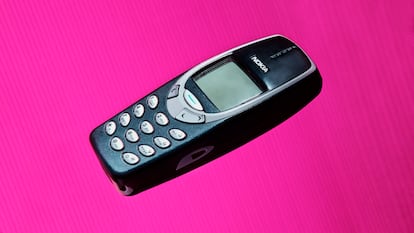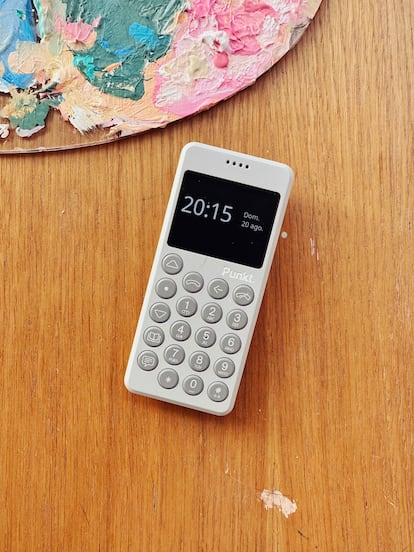‘Dumbphones’ make a comeback: ‘No one calls me anymore’
The most basic mobiles are now being used by people resisting excessive connectivity

Remember your first Nokia, Alcatel or Ericsson mobile phone — those analog devices that could barely make intelligible calls? How about when you got your first phone that could send text messages? Over time, we became enlightened — the BlackBerry and then the iPhone revolutionized mobile phones, causing widespread disdain for those earlier models. Designed for quick and easy communication, they served their purpose well and rested in peace.
Smartphones created a brand-new need: hyperconnectivity. Email, instant messaging and social media followed, causing an urge to be constantly connected. However, this shift brought consequences, as experts noted a rise in mental health problems among young people unprepared for the immediacy of social media. The condition is known as nomophobia (no mobile phone phobia) — when your cellphone becomes a source of pleasure and addiction. Now, a growing number of counterculture users in the United States are renouncing hyperconnectivity and returning to basic mobile phones that are only good for voice calls.
iPhone? How about a Nokia with no data?
“I needed time for myself,” said writer Jesús Terrés after announcing on social media that he was going on a smartphone detox. But Terrés wasn’t leaping headfirst into the void — he has a “dumbphone” for calls and occasionally resorts to using his smartphone. Terrés admits he misses having Google Maps, but doesn’t mind giving up addictive social media that he compares to ordering a third drink at a bar. “It seems like a good idea at the time, but rarely is.”
Disconnecting from technology takes courage. Sergio Barranco, a music teacher at the San Sebastián Conservatory in Spain, resisted pressure for years by sticking to his basic mobile phone, but finally broke down and got a smartphone. “Everyone was happy about it,” he said. “Now they can reach me by other means besides SMS or voice calls… It was much easier for them.” Barranco finally gave in, but it peeves him every time he looks fondly at his old brick of a phone. “Once you dive into WhatsApp, things can get complicated,” he said with resignation. “On the other hand, you get to talk to a lot more people.”
“We are seeing that basic phones resonate with several demographics and generations,” said Lars Silberbauer, Nokia’s marketing director. He mentions “digital exhaustion” among young people, who are taking a step back and thinking about basic mobile phones.
Manufacturers rarely disclose exact sales figures, but Swiss company Punkt has reported a sales boost, particularly among the younger demographic. “Sales increased over 30% in 2022 compared to the previous year,” said Adam Thomas, Punkt’s communications officer. “With the launch of a touchscreen model later this year, we anticipate further growth.” According to Hayley Dodd of HMD (Nokia’s manufacturer), basic mobile sales doubled in 2022 and the company expects sustained growth of these models in 2023.
Counterpoint Research confirms that dumbphones are experiencing a surge in popularity. In the United States alone, an estimated 2.8 million of these devices are expected to be sold by 2023. Counterpoint notes that rising sales can be attributed to the interest in “digital detox” among millennials and Generation Z.
‘It’s like living in 1999′
It’s all about communication, relationships and staying connected… Or so we thought. “No one calls me anymore,” said Terrés, who experienced firsthand the data plan tyranny. People no longer want to talk… at most they send audio messages. But he says voluntary ostracism has a very positive side effect — “I read a lot more books now.” But why give up the intoxicating delights of WhatsApp and TikTok if you don’t have to?

In addition to the obvious advantages for mental health, a growing number of people perceive this challenging solitude in a positive light. “It’s like living in 1999,” wrote Gregory Alvarez, describing his now (almost) definitive disconnection. Of course, there’s a whole subforum on Reddit dedicated to transitioning to basic mobile phones. Interestingly, the forum’s first recommendation is not to switch phones entirely, but rather to keep your smartphone and limit its functionality. Both Android and iPhone have parental controls that effectively restrict device functions, giving them a similar feel to old Nokia phones.
Other advantages
Dumbphones are undeniably sturdy and reliable. Who can forget the epic drops of those prehistoric Nokia phones? They often went flying and survived without a scratch. Check out this viral video of an old Nokia 3310 bravely withstanding all manner of torture. Just a tiny slip of your modern smartphone can lead to cracked screens and scratched cases… and repairs definitely don’t come cheap.
Another major advantage of this type of device is that they don’t have color touch screens or complex processors, resulting in a long battery life — charging once a week is usually sufficient. Moreover, they are less vulnerable to cyberattacks, which is crucial for privacy-conscious individuals. Lastly, there’s the cost factor: a Boost Mobile Prepaid Schok Flip will only set you back $20 at Target.
“Social networks aim to keep us engaged by utilizing tactics like infinite scrolling and enticing short videos that make us think, ‘just one more,’” said psychologist Joan Salvador Villalonga. “They deprive us of healthy leisure time, leading to less tolerance for boredom… We futilely try to please other people with short-lived posts, which is leading many people to abandon social media and restore their sense of freedom.” In short, dumbphones help us break free from the virtual world so we can redirect our focus back to the vibrant reality that surrounds us.
Sign up for our weekly newsletter to get more English-language news coverage from EL PAÍS USA Edition
Tu suscripción se está usando en otro dispositivo
¿Quieres añadir otro usuario a tu suscripción?
Si continúas leyendo en este dispositivo, no se podrá leer en el otro.
FlechaTu suscripción se está usando en otro dispositivo y solo puedes acceder a EL PAÍS desde un dispositivo a la vez.
Si quieres compartir tu cuenta, cambia tu suscripción a la modalidad Premium, así podrás añadir otro usuario. Cada uno accederá con su propia cuenta de email, lo que os permitirá personalizar vuestra experiencia en EL PAÍS.
¿Tienes una suscripción de empresa? Accede aquí para contratar más cuentas.
En el caso de no saber quién está usando tu cuenta, te recomendamos cambiar tu contraseña aquí.
Si decides continuar compartiendo tu cuenta, este mensaje se mostrará en tu dispositivo y en el de la otra persona que está usando tu cuenta de forma indefinida, afectando a tu experiencia de lectura. Puedes consultar aquí los términos y condiciones de la suscripción digital.









































